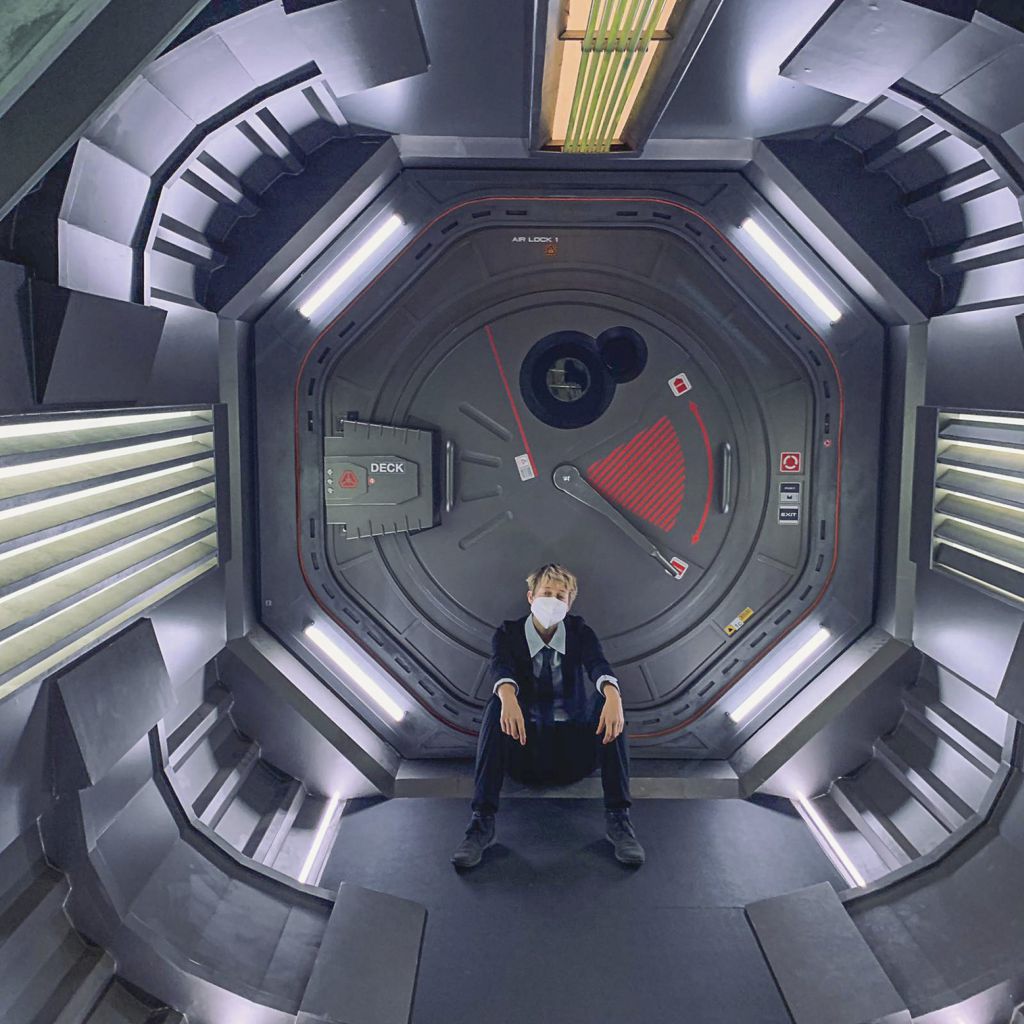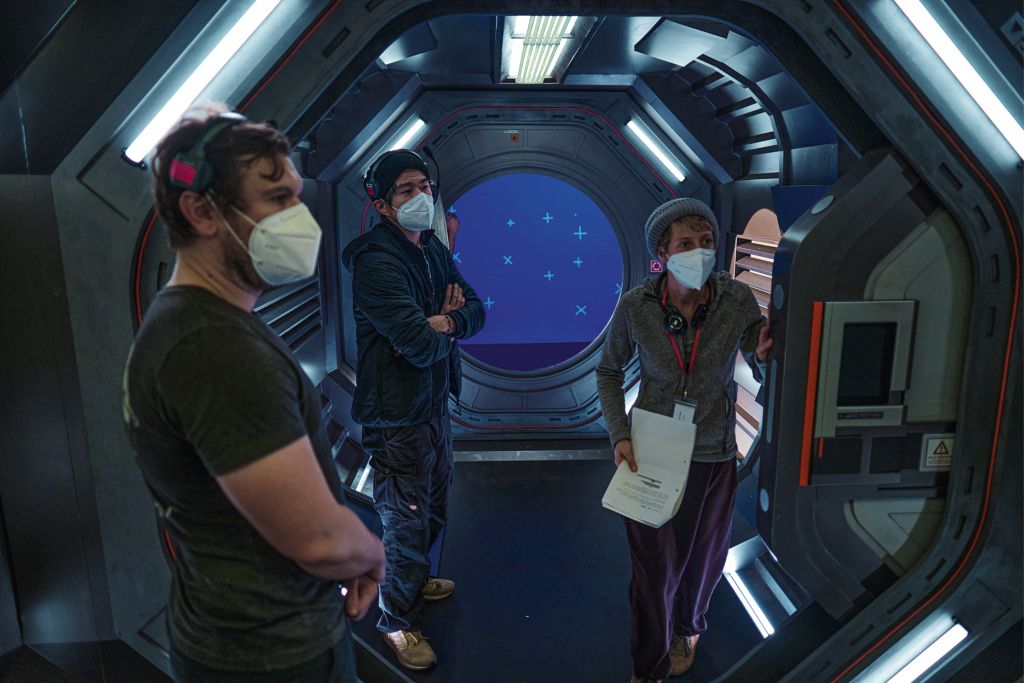The film industry is a rough place. Brutal competition along with the pressure to perform and deliver, tight schedules, and financial insecurity can combine to produce considerable mental strain. Which is why film director Leni Lauritsch has launched a new course with the intent of better preparing the young film professionals of Film Academy Vienna to deal with it all. In her own feature film debut, Film Academy alumna Leni Lauritsch conjured up a daring Sci-Fi dystopia that postulates the Earth’s disappearance in a visually impressive way. It was an unmitigated success: Rubikon (2021) racked up impressive international sales figures and was shown not only in Austrian but also in American cinemas. However, the young director associates Rubikon with more than just emotional highs—because for her, one consequence of the sustained overload and psychological pressure she experienced during the production process was burnout.

Following her studies at Film Academy Vienna, Lauritsch had to learn quite painfully just how tough things are out there in the real film industry, far removed from the protected sanctuary of everyday student life. “If you lack a very stable surroundings and a stable life situation, it can have a severely negative impact on your psyche,” she says in our interview. Over the course of her rehabilitation and therapy, she became acquainted with the concept of “psychoeducation”—a therapeutic intervention in which specialised knowledge about patients’ own illnesses, principal therapeutic measures, and possible self-help strategies are used to guide patients toward dealing responsibly with their illnesses and successfully overcoming them. Lauritsch was astonished at how much applicable knowledge modern psychology has already produced—which, she’s convinced, could have indeed helped her avoid burnout in the first place.
In order to make that knowledge accessible and support young students, Leni Lauritsch has been teaching a course on mental health at Film Academy Vienna since this October. “My concept is first and foremost to convey the present state of scientific knowledge regarding our own psyches—because here, knowledge really is power!” Young artists across the board are at high risk: “In general, the meritocracy under which we live is unfortunately quite taxing to begin with—but artists who put themselves out there in such a personal way with their works and are dependent on prizes, festival invitations, and/or audience turnout also suffer from extreme degrees of competition and for the most part precarious financial situations and are at far higher risk of being afflicted with increasingly common civilisational illnesses such as burnout, depression, and anxiety disorders.”
That the Austrian film industry’s precarious working conditions are hazardous to the mental health of those whom it affects is also backed up by the study MACHT – ARBEIT – KRANK? [Does Work Cause Illness?]1, which was published in 2020. Its online questionnaire, which was circulated from December 2019 to February 2020, generated responses from 456 Austria-based film professionals. This survey’s findings give cause for alarm, with the associated report indicating that 40% of the respondents had already been victims of physical violence. Conducive to this, holds the report, are the Austrian film scene’s small networks and powerful hierarchies. Self-defence amidst the precarious prevailing conditions is often difficult for those affected, for the fear of being replaced by someone else is great. Exacerbating this is the fact that gainful employment is viewed by most people in this industry as more than just a way to make a living. As a result, difficult working and employment situations are put up with far too often.
Film Academy Vienna directing student Jan Prazak is familiar with the film industry’s darker sides: “I personally have a hard time living with the uncertainties that come with this profession. Your own future isn’t plannable, and the fear of not being able to make a living from what you do is huge.” He’s often felt like he had to accept every job, even if the working conditions were precarious. “Filming, with its 12-hour days, is unbelievably strenuous to begin with—and when the atmosphere on set is bad and people are disrespectful to each other, it all gets to be too much.” Prazak experiences the conditions at the Film Academy as quite different: “One has way more time, and there’s zero external pressure. The Film Academy has been a safe space for me that’s made it easy to do creative work.” Even so, opportunities for exchange on the topic of working conditions and the consequences for one’s own mental health could really stand to be given more space in students’ training, says Prazak. The goal shouldn’t, however, be for everyone to just develop a “thicker skin”: “It’s the structures within the industry itself that need to change, not the people who work in it,” says Prazak.

For some, the psychological challenges begin even during their professional training. Lena Zechner, a production student at Film Academy Vienna, spoke in her interview about the great pressure to perform and what she herself needs. “Particularly in my field of study, a great number of tasks that our industry normally divides among multiple positions fall to me as a producer-in-training. That brings with it high levels of both stress and responsibility, for which I’ve often felt insufficiently prepared.” It’s for this reason that, alongside the specialised know-how that she’s acquiring through her training and her projects, she considers it essential to also sharpen her awareness of her own mental health and that of her colleagues. While working on a coproduction with students of Film Academy Baden-Württemberg, Zechner took part in a coaching programme that features as a permanent component of that institution’s offerings. In a conversation moderated and guided by a trained coach, she spoke with her co-producers about their respective behaviours under stress and in conflicts. The individual tips aimed at improving the dynamics and communication within her team were of great value, says the production student: “I’d absolutely welcome such an individualised offering at Film Academy Vienna!”
Zechner takes a positive view of the new course offering at her own university: “I view it as a ray of hope that we’re now talking about mental health at an institutional level both in our training and in the industry. This offering can’t, of course, replace individual advising geared to those teams and projects that need it—but it doesn’t have to do that if the point is to create a basic awareness of the topic.” Prazak, too, is optimistic that this course will help more people learn to communicate their needs and set boundaries: “I think it’s great and also courageous that Leni is sharing her own experiences with the students. It represents an important first step toward removing the taboo from this issue and creating a feeling that one can indeed speak openly about one’s psychological well-being at work.”

